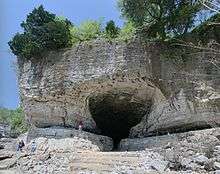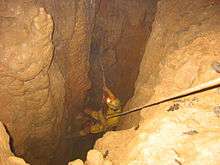cave
English
Etymology 1
From Middle English, borrowed from Old French cave, from Latin cava (“cavity”), from cavus (“hollow”), from Proto-Indo-European *ḱówHwos (“cavity”) (compare Irish cúas (“hollow, cavity”), from Proto-Indo-European *ḱówH- (compare Tocharian B throat (kor), Albanian cup (“odd, uneven”), Ancient Greek κύαρ (kúar, “eye of needle, earhole”), Old Armenian սոր (sor, “hole”), Sanskrit शून्य (śūnya, “empty, barren, zero”)).
Pronunciation
- enPR: kāv, IPA(key): /keɪv/
Audio (US) (file) - Rhymes: -eɪv
Noun
cave (plural caves)

- A large, naturally-occurring cavity formed underground or in the face of a cliff or a hillside.
- 1918, W. B. Maxwell, chapter 16, in The Mirror and the Lamp:
- The preposterous altruism too! […] Resist not evil. It is an insane immolation of self—as bad intrinsically as fakirs stabbing themselves or anchorites warping their spines in caves scarcely large enough for a fair-sized dog.
- We found a cave on the mountainside where we could take shelter.
-
- A hole, depression, or gap in earth or rock, whether natural or man-made.
- A storage cellar, especially for wine or cheese.
- This wine has been aged in our cave for thirty years.
- A place of retreat, such as a man cave.
- My room was a cozy cave where I could escape from my family.
- (caving) A naturally-occurring cavity in bedrock which is large enough to be entered by an adult.
- It was not strictly a cave, but a narrow fissure in the rock.
- (nuclear physics) A shielded area where nuclear experiments can be carried out.
- (drilling, uncountable) Debris, particularly broken rock, which falls into a drill hole and interferes with drilling.
- (mining) A collapse or cave-in.
- 1885, Angelo Heilprin, Town Geology: The Lesson of the Philadelphia Rocks, page 79:
- The "breasts" of marble which unite the opposite lateral walls have been left standing in order to prevent a possible cave of the wall on either side.
-
- (figuratively, also slang) The vagina.
- 1976, Chester Himes, My Life of Absurdity, page 59:
- Then without a word she lay on her back in the bed, her dark blond pubic hair rising about her dark wet cave like dried brush about a hidden spring.
-
- (slang, politics, often "Cave") A group that breaks from a larger political party or faction on a particular issue.
- (obsolete) Any hollow place, or part; a cavity.
- Francis Bacon
- the cave of the ear
- Francis Bacon
- (programming) A code cave.
- 2016, Nick Cano, Game Hacking: Developing Autonomous Bots for Online Games
- Once a code cave is created, you can execute it using either thread injection or thread hijacking. […] Additionally, you'd need to make sure that the cave properly cleans the stack.
- 2016, Nick Cano, Game Hacking: Developing Autonomous Bots for Online Games
Synonyms
Derived terms
Translations
|
|
|
|
|
|
|
Verb
cave (third-person singular simple present caves, present participle caving, simple past and past participle caved)

- To surrender.
- He caved under pressure.
- To collapse.
- First the braces buckled, then the roof began to cave, then we ran.
- To hollow out or undermine.
- The levee has been severely caved by the river current.
- To engage in the recreational exploration of caves; to spelunk.
- I have caved from Yugoslavia to Kentucky.
- Let's go caving this weekend.
- (mining) In room-and-pillar mining, to extract a deposit of rock by breaking down a pillar which had been holding it in place.
- The deposit is caved by knocking out the posts.
- (mining, obsolete) To work over tailings to dress small pieces of marketable ore.
- (obsolete) To dwell in a cave.
- ante 1611, Shakespeare, William, Cymbeline, Act 4, Scene 2:
- although perhaps / It may be heard at court that such as we / Cave here, hunt here, are outlaws, and in time / May make some stronger head
-
Translations
|
|
Etymology 2
Borrowed from Latin cavē, second-person singular present active imperative of caveō (“to beware”). Used at Eton College, Berkshire.
Pronunciation
- enPR: kāʹvē, IPA(key): /ˈkeɪvi/
- Rhymes: -eɪvi
- Homophone: cavy
Interjection
cave
- (Britain, school slang) look out!; beware!
- 1989, Hugh Laurie as Lt. George, Private Plane (Blackadder Goes Forth), season 4, episode 4, written by Ben Elton & Richard Curtis:
- Ssh! Cave! Mum's the word! Not 'arf, or what?
-
Synonyms
- heads up, look out, watch it, see also Thesaurus:heads up
Derived terms
Translations
French
Pronunciation
- IPA(key): /kav/
Audio (file)
Etymology 2
Borrowed from Late Latin cava, substantivized form of Latin cava, feminine of the adjective cavus.
Noun
cave f (plural caves)
Anagrams
Further reading
- “cave” in le Trésor de la langue française informatisé (The Digitized Treasury of the French Language).
Latin
Portuguese
Pronunciation
- Rhymes: -avi